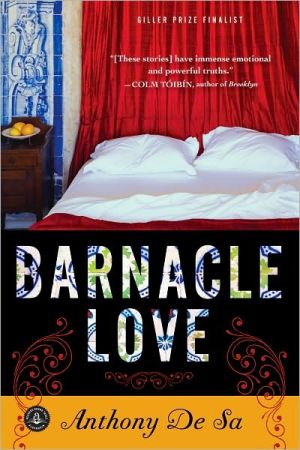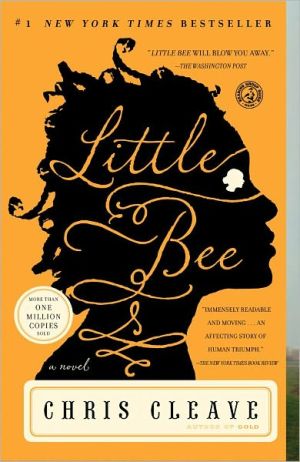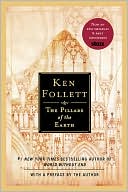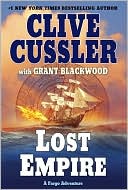Barnacle Love
Shortlisted for the 2008 Scotiabank Giller Prize\ Like Wayson Choy and David Bezmozgis before him, Anthony De Sa captures, in stories brimming with life, the innocent dreams and bitter disappointments of the immigrant experience.\ At the heart of this collection of intimately linked stories is the relationship between a father and his son. A young fisherman washes up nearly dead on the shores of Newfoundland. It is Manuel Rebelo who has tried to escape the suffocating smallness of his...
Search in google:
Anthony De Sa makes his fiction debut with this stunning collection of interlinked stories that explore the innocent dreams and bitter disappointments of the immigrant experience. Hailed as “tender and raw, morbid and surprisingly gentle” by the Vancouver Sun, Barnacle Love was a finalist for Canada’s highly prestigious Giller Prize. Moving from a small Portuguese fishing village in the Azores to the shores of Newfoundland, Barnacle Love then takes us into the dark alleys of Toronto’s Portuguese community in the 1970s. The first half of the book is told by Manuel Rebelo, who has fled his homeland—and the crushing weight of his mother’s expectations—to build a future for himself in a new land. Manuel struggles hard to adjust, but fulfilling the promise of his adopted home is not as simple as he had hoped. The second half of the book is told with candor by Manuel’s son Antonio, who—along with his sister and mother—lives in the shadows cast by Manuel’s failures. With fantastic, sometimes magical details and passionate empathy, Anthony De Sa invites readers into the lives of the Rebelo family. The results are, in the words of writer Nino Ricci, “haunting and elegiac.”The New York Times - Tom LeClairAlthough the book invites psychological analysis, its originality is anthropological, presented in descriptions of a Portuguese fishing community whose commonplace customs are retained even in a North American city.
TERRA NOVA\ \ For nothing is fixed, forever and forever and forever, it is not fixed; the earth is always shifting, the light is always changing, the sea does not cease to grind down rock. Generations do not cease to be born, and we are responsible to them because we are the only witnesses they have. The sea rises, the light fails, lovers cling to each other, and children cling to us. The moment we cease to hold each other, the sea engulfs us and the light goes out.\ James Baldwin\ ~ OF GOD AND COD ~\ there is nothing he can do. He is lifted high into the air by the swells that roll, break, and crash upon themselves. His dory is smashed, the flotsam scattered: pieces of white jagged wood afloat, tangled in knotted rope, nothing much to grab hold of before the ocean lifts him higher, only to drop him into its turbulent waters, catching him in the current. Again, he pierces the surface, the biting cold filling his lungs as he coughs and sputters. It is the moment he needs. He reaches into his sweater and draws out the crucifix, which glistens in the moon’s light. He twirls it between puckered fingers, places it in his mouth–between his clicking teeth. He feels its weight and shape cushioned on his tongue, closes his blue lips and allows himself to let go, to sink beneath the foaming surface into the dark molasses sea.\ Big Lips. Are you here?\ ~\ The Portuguese call it saudade: a longing for something so indefinite as to be indefinable. Love affairs, miseries of life, the way things were, people already dead, those who left and the ocean that tossed them on the shores of a different land–all things born of the soul that can only be felt.\ Manuel Antonio Rebelo was a product of this passion. He grew up with the tales of his father, a man who held two things most sacred, God and cod–bacalhau–and not always in that order. His father’s words formed vivid pictures of grizzled brave fishermen and whale hunters who left their families for months to fish the great waters off Terra Nova, the new land. Visions of mothers shrouded in black, of confused wives–the pregnant ones feeling alone, the others glad for the respite from pregnancy–spun in his mind. And then there were the scoured children, waving in their Sunday finery. The small boys bound in worn but neatly pressed blazers and creased shorts. The little girls scattered like popcorn in their outgrown Communion dresses as they watched their fathers’ ascents onto magnificent ships. In his dreams Manuel saw the men with their torn and calloused hands, faces worn, dark and toughened by the salted mist. As a child he would sit by the cliffs for hours, dangling his bare feet over the side of the hundred-foot drop to the shore, kicking the rock with his pink heels, placing his hands over his eyes to shield the sunlight, already yearning for the fading figures of the White Fleet.\ “One day I’ll disappear,” he’d say aloud.\ He could make out the faint shadow of a large fish that circled just under the skinned surface of the water.\ “Did you hear that, Big Lips?” he shouted.\ As if in response, the large grouper seemed to stop. Manuel could see the fish’s fins fanning against the mottled blue and green of the ocean’s rocky shallows. He had once befriended one of these gentle giants. The villagers believed that these fish could live for up to one hundred years. This was in part due to the story of Eduarda Ramos, one of the village midwives, who insisted she had reclaimed her wedding band from the belly of a large grouper her son had caught–fifty-three years after she had lost the ring while cleaning some fish by the shore.\ As the large fish swam away and disappeared into the ocean’s darker depths, Manuel couldn’t help but wonder if the fish he had named was still alive. If the fish he had just seen was Big Lips.\ Manuel’s yearning became a palpable ache. The Azores held nothing for him. The tiny island of São Miguel was suffocating, lost as it was in the middle of the Atlantic. Early in life he knew the world his mother had formed for him was too small, too predictable. He was the oldest boy. But it wasn’t for this reason alone that Manuel carried the burden of his mother’s dreams. He bore a close resemblance to his father: the liquid steel colour of his eyes, his thick stubborn mound of blond hair, and the round angelic features of his face. The blunt noses, darker skin, and almost black, shrimp-like eyes that adorned his siblings had been borrowed from his mother’s side. Manuel thought they were all pretty and he loved them, but he also knew that in his mother’s mind they held no promise.\ “You are your father’s son. He lives in you,” she’d sigh. “You possess his greatness.” Manuel felt her breasts pressed flat against his back, her sharp chin digging into his head. “I can smell it in your breath’s sweetness.”\ Maria had plucked Manuel out of her brood and he became the chosen one. Her ambitions for her son were firm rather than clear: Manuel would become a man of importance, learned and respected in the village and beyond. He would have the advantage of private tutors, which meant his siblings would need to keep the bottoms of their shoes stuffed with corn husks to clog the holes and keep their feet dry. Manuel was often ashamed of himself as he walked up Rua Nova with his brothers and sisters, his polished shoes shining like the blue-black of a mussel. He would be taught a rigorous catechism by the village priest, Padre Carlos. The teachings of God would make him fair and virtuous.\ “It’s all for you, filho,” she’d say, often in front of her other children as they went about, cowering, in their daily chores. It was only because they loved Manuel and never once blamed him for anything they were denied that he began to resent his mother’s cruelty.\ His ten-year-old brother Jose came home one day with a sick calf that he walked through the front door and into their narrow dark hallway. Everyone smiled and watched as the brother who loved animals above anything else tugged at the sickly calf, urged it out the back door toward a patch of tall grass. But the pastoral calm was interrupted by the sharp crack of dry wood. Manuel saw his young brother fall to the packed-earth floor like a ball of dough. His cheek lay pressed against the floor, he was afraid to lift his head. He licked the blood that trickled from the corner of his mouth. Manuel looked to his mother, who held the splintered end of the broom over her shoulder. She picked the boy up by the scruff of his collar and he dangled from her clenched fist.\ “You get this filthy beast out of here. This is our home, not a barn,” her voice shook.\ Jose turned the nervous animal around and, still in a daze, directed the reluctant calf back out the front door. Albina and the others continued their work. Maria Theresa da Conceição Rebelo sat back down on the chair and poured the beans into the sagging lap of her apron. Manuel picked up the broom. Looking straight at his mother, he flung the broken handle across the kitchen. The stoneware bowls that had been carefully set on the barnboard table smashed. He heard the drawn breaths of his sisters. His mother stood and the beans sprung from her apron across the floor. She cocked her hand over her shoulder. He stood still for what seemed like an eternity, challenging her with his glare. She lowered her arm as he stormed after his brother.\ He was twelve then. Manuel vowed that somehow he would make it all better. Freedom would provide opportunities for his siblings. But first, he would have to save himself.\ Now, at the age of twenty, Manuel maintained an indifference to Maria’s ambitions. Every spring he would venture to the same spot and perch himself on the overhang. He would look out to the sea, feel the warming winds against his pale smooth skin. His still-boyish cowlick pressed against his forehead. He’d carefully roll each of his socks into a ball, stuff them into his new leather shoes, to kick his now yellowed heels against the cliff wall with a vigour that had only intensified during the months he had spent in the mildewed Banco Micaelense, counting out escudos with a vacant smile, throwing open all windows to breathe in the sea, hearing Amalia’s despair on the radio, her riveting outbursts of emotion. He knew it was time to tell his mother.\ “Mãe, I’m going away for a while,” he said.\ She continued to hang the laundry on the line, the stubborn stains facing the house, the cleaner sides billowing toward the neighbours. She held wooden clothespins in her mouth–sometimes three at a time–securely between her crowded teeth.\ “Mãe, look at me,” he urged. “I need to go. I need to be part of a bigger world. I need to know if there’s room out there for me.”\ Her job was only interrupted for a fraction of a second. Manuel realized she had been waiting for this. Only yesterday she had walked into the bank, and he had noticed a disguised sadness in her step as she approached him in his white shirt and tie; she had pressed the shirt that morning and was pleased that the crease in his cuff had held. She continued hanging the clothes as if she hadn’t heard. But Manuel could sense her anger, the disappointment in allowing herself to believe it was possible for her children to want for themselves the same things she did. Maria Theresa da Conceição Rebelo stopped. Manuel looked away for a moment to catch the silhouettes of his brothers and sisters behind the muslin curtains of the house. Albina was twenty-two and the oldest child. Her hands rested on their young brothers, Mariano and Jose. They were eighteen, only ten months apart. Candida was fifteen and sat on the sill with her back leaning against the drapes. He had expected them to be there, listening from inside their shared bedrooms. He chose to move his blurred vision back toward his mother. His eyes travelled up to her hair, to the wisps that looped up, barely held by her hair comb. When did her hair turn grey? he thought.\ “Mãe–”\ “You look like your father.”\ She walked toward the house wiping her hands on a torn apron, kicking with her bare feet the feeding hens that got in her way. As she reached the door, she bent down and scooped one of the hens up and under her freckled arm. Turning to face her son, she stroked the chicken’s head with her free hand before her swollen, red fingers closed around its thin neck and tugged; just one quick yank before the bird’s head fell, still jerking.\ “Your supper will be ready soon,” and she slammed the door.\ They had not spoken. The night before he left, his mother had locked herself in her room. He found a package, brown folded paper tied neatly with trussing string, outside her bedroom door. He knew she wouldn’t come out. It had been too painful the first time, fifteen years back, when she had wrapped some cheese, bread, chouriço, and a few loose sheets of paper and bundled them all together with an embroidered dishtowel before she embraced her husband Antonio for the last time.\ Manuel untied the knots, their whorls flicking against the parcel. He stood in front of her door, hoping she’d hear the rustling of paper. He was mindful of refolding the paper and rolling the string into a ball–his mother could use it again. In the parcel, Manuel found a yellowed fisherman’s sweater smelling of ocean, and in a tiny envelope made of tin wrap, his father’s gold crucifix and chain. They were the only things that she had left of her husband; his body had been buried at sea. There were no words written on the paper or in the folds. He checked. He tried knocking, then stopped after three soft raps and put his lips to the door, touching the grain.\ “Adeus, Mãe,” he whispered.\ He couldn’t recall exactly what his father looked like, only his blue-grey eyes and warm smile. But he did remember sitting on his father’s knee and looking for the gleaming crucifix buried in his father’s chest hair. This was the same chain that he now placed around his neck. He swung the sweater under his arm and tossed his duffle bag over his shoulder, his fingers whitened by the strain. Later, tucked in his socks or wrapped in his underwear, Manuel would discover the gifts secretly offered, for fear of their mother’s disapproval, by his siblings: Albina’s embroidered M handkerchief, the copper whistle Jose used to herd cattle, and Mariano’s pocket knife. Also in his bag, pressed between his cotton undershirts, was a black-and-white photograph of Candida, lips pursed like a Hollywood actress caught in a hazy cloud of smoke. Manuel walked down the silent corridor and out the front door.\ He arrived in the cobbled square of Ponte Delgada before daybreak. The rigged ships waited, tethered to the docks; their white sails reflected the morning moon but barely rippled in the early breeze behind the makeshift altar. The altar had been constructed on the docks and bore the symbol of an intertwined cross and anchor. The sails would form the backdrop for the traditional farewell mass. Soon the square would be filled with crowds pushing their way up to the front, wanting to be touched by the priest, blessed by his hand.\ Manuel once understood that desire and need. He had reached out as a young boy when faced with the loss of his father. But his trust had been betrayed and his want silenced. He hadn’t thought of Padre Carlos for a while. Some things were best pushed far back into the dark places of the mind. But the impending voyage, his mother’s inability to understand his decision, had awakened the loneliness he had felt as a boy.\ “Those who serve me, serve God,” Padre Carlos had whispered.
Part I Terra Nova Of God and CodReason to Blame FadoMade of MeBarnacle Love Part II Caged Birds Sing Urban Angel Shoeshine Boy Senhor CanadaPounding Their ShadowsMr. Wong Presents JesusAcknowledgements
\ The Globe and Mail“A moving and engaging read, its memorable images and heart’s woes sometimes visceral in their power.”\ \ \ \ \ The Boston Globe"These beautifully connected stories follow Manuel from Sao Miguel, one of the tiny islands in the Portuguese Azores, to Toronto where he goes to seek a better life for himself." --The Boston Globe\ \ \ \ Library JournalBorn in a fishing village in Portugal, Manuel always felt he was destined for greatness. Against his mother's wishes, he goes to sea on a mid-Atlantic cod fishing vessel. He spends time ashore in Canada and decides he wants to remain but after several adventures is forced to come home. As an adult, he returns to Canada and raises his family in Toronto but never fulfills his imagined promise. The early part of the book, relating Manuel's adventures at sea and on shore, has a mythical quality. So it's rather jarring when we later view the middle-aged Manuel as a disillusioned alcoholic through the eyes of his son Antonio. While compelling in its own way, the latter half of the book bears the familiar outline of the typical immigrant story: parents pressuring their children into high-status, lucrative careers and clashes between the parents' traditional way of living and their children's desire to assimilate into the dominant culture around them.Verdict For those who enjoy immigrant stories.—Christine DeZelar-Tiedman, Univ of Minnesota Libs., Minneapolis\ \ \ \ \ Kirkus ReviewsLinked episodes in the life of an émigré from a Portuguese fishing community in the Azores trace bitter legacies through three generations.\ Barnacle love, meaning painfully conflicted passion—powerfully realized in the image of a marriage bed strewn with glass and barnacle shells in the title story—is the emotion that haunts Canadian De Sa's dark, lyrical, sparely evoked sequence of tales, a finalist for the Giller Prize. Complicated connections between parents and children mark several stories, notably "Of God and Cod," in which central figure Manuel Rebelo, favored by his harsh mother over his siblings, escapes the mid-Atlantic island of his birth and is almost drowned. Rescue will lead to romance, then a revelation of deception, in "Reason to Blame," and as Manuel's life unravels, so new disappointments occur. The title story explains his marriage to Georgina, not his first choice. And the volume's second half, narrated by his son Antonio, exposes the parents' unhappiness and Manuel's financial failure. "Senhor Canada" observes Manuel and Antonio on Canada Day, the father drunk and sentimentally patriotic, the son consumed with shame. Sometimes overemphatic, the narrative sequence is threaded with themes and symbols: broken glass, suspicions of the church, "good hurt," the need to escape. Manuel's frustration and despair reach their apogee in "Mr. Wong Presents Jesus," in which tragedy hovers on Christmas Eve.\ Intense, melancholy, occasionally overworked, De Sa's brooding debut illumines displacement and despair with glinting literary highlights.\ \ \ \ \ \ Tom LeClairAlthough the book invites psychological analysis, its originality is anthropological, presented in descriptions of a Portuguese fishing community whose commonplace customs are retained even in a North American city.\ —The New York Times\ \








